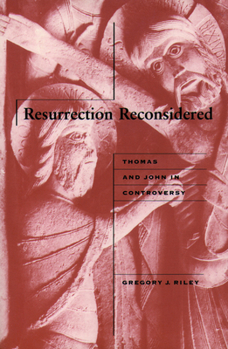Resurrection Reconsidered
This study centers on a protracted debate within early Christianity concerning a foundational aspect of the Gospel of Thomas and its related literature: the concept of the body and resurrection. It traces the background of this idea in the Semitic and Greco-Roman world, and its expression in the Thomas literature as a whole: the Gospel of Thomas, Book of Thomas, and Acts of Thomas. But the inspiration for the study, and its main focus, is the controversy...
Format:Paperback
Language:English
ISBN:0800628462
ISBN13:9780800628468
Release Date:March 1995
Publisher:Fortress Press
Length:232 Pages
Weight:0.75 lbs.
Dimensions:0.6" x 5.5" x 8.4"
Customer Reviews
4 ratings
well connected research from ancients to gnostics
Published by Thriftbooks.com User , 17 years ago
Gregory Riley establishes in "Resurrection Reconsidered" a chronologic flow of the belief systems from Hellenistic Greek and ancient Hebrew times down to the Christian Gnostic writings of Thomas. Prof. Riley here comes across with more specific references and demonstrated cohesion between one time period's influence on the next than his prior work "The River of God". He well establishes the Greek Homer/Plato immortal soul concept as the forerunner and influence for the Gnostic Thomas group's position regarding physical resurrection. He also shows the difficulty of lack of hard factual evidence to determine exactly what an everyday ancient Hebrew believed concerning the afterlife and the variety of fates the Hebrew Bible presents: no afterlife in Job, resurrection of the righteous only in Daniel, global resurrection in Isaiah, and then a review of the Christian scriptures which is just as, if not more diverse. He shows Paul's statements like 1Cor. 15:44-52 and 2Cor 5:8 discussing resurrected spiritual bodies at odds with the physical bodily resurrected Jesus of John 20 and Luke at Acts 26:8 as examples among others: "why is it considered incredible among you if God does raise the dead?" He goes on to demonstrate the John/Thomas follower controversy where the Thomas writings are in direct contrast to John/Luke. As the Book of Thomas declares "woe to you who hope in the flesh, in the prison which will perish." Riley also well establishes how this question is "far too simplistic to substantiate" by viewing it as a mere contest between "Jewish belief in a physical resurrection vs. Greek immortal soul doctrine. The controversy continues down to this day. This work has a lot of information and is well researched for it's 180 pages.
Brilliant exposition
Published by Thriftbooks.com User , 18 years ago
This book contains erudite material stated in straightforward terms. Contra William Lane Craig's published contention that the concept of resurrection in first century CE Palestine entailed physicality, Professor Riley demonstrates in no uncertain terms that the cultural milieu was thoroughly Hellenized and that original Christianity was closer to believing spiritual resurrection of the soul than fleshly resurrection. The author carefully traces the pre-Christian spiritual concepts of resurrection and their impact upon canonical and noncanonical literature. Highly recommended.
Impressive scholarship
Published by Thriftbooks.com User , 19 years ago
Riley's book portrays the Johanine and Thomas communities in conflict over the doctrine of bodily ("fleshly") resurrection. Bodily resurrection was a radical idea, strange and even repulsive to people reared in the widely prevailing Greco-Roman tradition, which viewed the soul as separate and distinct from the physical body in which it is held prisoner. Only the liberated soul continues to exist after death, while the body decays away. The Thomas community took that traditional view, which placed it at theological odds with the writer of the Gospel of John and the developing Christian orthodoxy. Why did early Christianity insist on the doctrine of bodily resurrection? (1) Judaic legacy: The idea could be found in some OT Scripture. (2) Justice: The soul should not be judged alone for the sins of the body, especially as sin arises from the desires of the body; reward or torment for the deeds of the body should be experienced by the body. (3) Unity of persons: The resurrection of a person must be, by definition, an embodied resurrection, because a person is a unity of body and soul, not separable into an evil physical body distinct from a good spiritual soul. (4) Humanity of Jesus: It is part of the proof that Jesus was truly of human flesh, before and after crucifixion. Riley analyzes parts of John's Gospel as a polemic aimed at the Thomas community, particularly in the way their spiritual mentor, the disciple Thomas, is portrayed. He is the disciple who never seems to understand and, in particular, he is the faithless doubter who demands to touch the wounds of the resurrected Jesus. When he finds he is able to do so, he capitulates completely, demonstrating to the Thomas community that the risen Jesus had a palpable, physical body. Thus, John's literary Thomas serves to provide the refutation of his own community's beliefs. The book is a bit too narrowly focused, lacking a final chapter to tell us how the dispute proceeded past the 2nd century. Looking at Erickson's 'Christian Theology,' it looks like orthodox Christianity eventually came out somewhere in between, with some version Paul's idea of resurrection into a new "spiritual body" becoming widely accepted. This is not a disembodied soul, but neither is it a body of ordinary flesh. It is imagined to somehow derive from the physical body, but without being a mere resuscitation. While it retains its identity, it is transformed in composition, perfected, perhaps intangible, and eternal. People might differ about whether that mostly vindicates the community of John, or of Thomas.
Facinating discussion of the various views of resurrection.
Published by Thriftbooks.com User , 25 years ago
This is an eye-opening, basic primer on the various views of resurrection among the early Christians: was there a spiritual or fleshly resurrection and why? The views of Jesus, Paul, and the Gospel of Thomas (spiritual resurrection) are contrasted with the position of the Gospels of John and Luke and Ignatius of Antioch (fleshly resurrection). Chapter One is a must!





